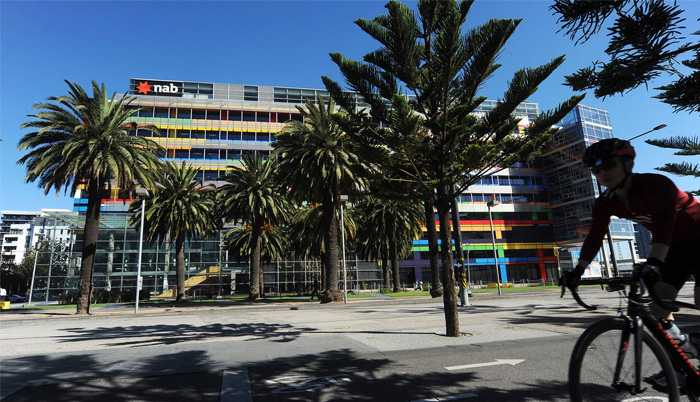![]() Home > World Business
Home > World Business
Australian Banks Raise Most In Bond Sales Since 2012

Photographer: Carla Gottgens/Bloomberg
![]() August 16th, 2016 | 08:18 AM |
August 16th, 2016 | 08:18 AM | ![]() 1136 views
1136 views
AUSTRALIA
Commonwealth Bank of Australia and its local rivals haven’t been this active selling bonds in at least four years.
With new rules encouraging banks to lock in their borrowings for longer, a slew of existing debt maturing and deposit growth trailing behind the expansion in lending, issuance this year by the biggest Australian banks has surged. The amount raised offshore by the four largest lenders has risen 41 percent to $46.4 billion so far in 2016, the most for any comparable period since 2012, while local sales climbed 72 percent to A$32.9 billion ($25.3 billion), the fastest pace since 2009, data compiled by Bloomberg show.
Unprecedented monetary easing from Japan to Europe has helped to drag down bond yields globally and spurred investor appetite for the premium offered by debentures from lenders such as Commonwealth Bank, National Australia Bank Ltd., Westpac Banking Corp. and Australia & New Zealand Banking Group Ltd. While the average yield on securities in the Bloomberg AusBond Credit Financials Index fell as low as 2.7 percent this month, there’s still a premium of about 1.2 percentage points over sovereign debt.
“The more funding they get done, the more certain they are of what they can lend out,” said Mathew McCrum, who helps oversee the equivalent of $1.5 billion as director of investments at Melbourne-based Omega Global Investors. “Certainty is going to be good for banks in terms of funding.”
Westpac last week sold $5 billion of U.S. dollar bonds in a five-part deal, while the $14 billion that NAB has raised offshore since Jan. 1 makes it the biggest Australian borrower in international markets so far this year. Commonwealth Bank has dominated the domestic company bond market over the same period, pricing A$10.6 billion of notes. ANZ announced on Tuesday that it was planning to raise about A$1 billion with an offering of Additional Tier 1 capital securities.
The major banks are being forced to boost their wholesale funding as the pace of lending growth outstrips the increase in deposits, a pattern that’s been in place since April 2015, according to monthly Australian Prudential Regulation Authority data compiled by Bloomberg. Loan balances climbed 7.4 percent in the year to June 2016 compared with a 5.4 percent expansion for deposits, the data showed.
In a bid to narrow the gap and maintain the share of funding accounted for by customers’ savings, the lenders this month chose to offer higher payouts on some term deposits even as the central bank cut its cash rate to a record low.
Changes to the global regulatory framework are also forcing internationally-active banks to take into account the maturity of their assets when making choices about their financing mix. Rules surrounding the so-called Net Stable Funding Ratio, implemented in response to the crisis that tore through global markets almost eight years ago, mean that banks are being encouraged to source more of their financing from deposits and longer-maturity wholesale paper.
“Our activity in wholesale funding markets reflects the regulatory changes including Net Stable Funding Ratio and more broadly our plan to make the best of the spreads on offer and extend our funding tenor,” Commonwealth Bank Chief Financial Officer David Craig said in an interview on Wednesday. “We would expect to raise a similar amount as last year from debt markets this fiscal year, and as we prefer a diversified funding program, the split between offshore and onshore raising wouldn’t be much different by the end of the year.”
Debt Appetite
The amount of existing wholesale debt coming due is also a factor driving issuance. Between them, the four major banks issued the equivalent of A$133 billion in bonds that were originally due to mature in 2016, compared with A$127 billion for 2015, according to data compiled by Bloomberg.
How much new money they’re likely to need going forward will be closely tied to the fortunes of the broader economy and Australians’ appetite for debt. The nation has been hit by a drop in mining investment and lower commodity prices, although the Reserve Bank of Australia has helped to ease the pain with interest-rate reductions that have put downward pressure on the currency and stoked a boom in housing. While the pace of mortgage growth has slipped from the decade-high 7.5 percent it reached last year, at 6.7 percent it remains above the five-year average, RBA data show.
A slowing Aussie economy may go a fair way toward curbing banks’ appetite for debt over the coming year, according to David Walker, senior analyst at Sydney-based Clime Asset Management which manages the equivalent of $380 million in equities.
“We’re heading into a prolonged period of slow growth for the Australian economy which will mean slow growth for banks,” he said. “Banks don’t have a great need for a lot of extra funding in that environment. They’re all about optimizing their existing portfolio.”
Source:
courtesy of BLOOMBERG
by Ruth Liew and Narayanan Somasundaram
If you have any stories or news that you would like to share with the global online community, please feel free to share it with us by contacting us directly at [email protected]